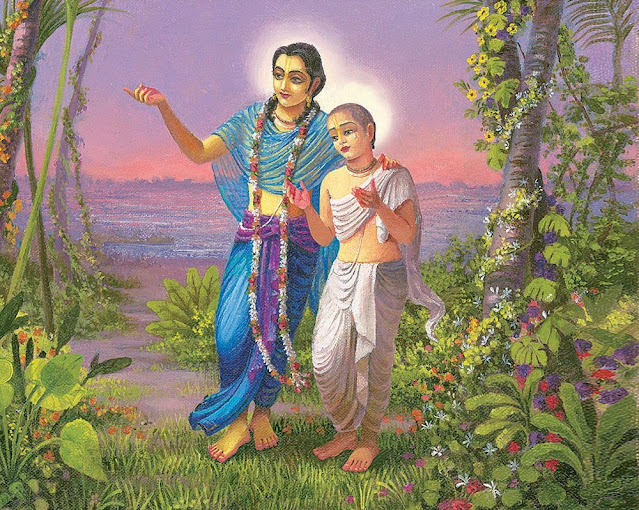6. "Neither the delible stamp of birth, worldly knowledge and riches do in any way stand in the way of devotion nor do low birth, ignorance and poverty help or endanger devotion. "
"It was in the year 1486 A.D. that Shri Chaitanya Deva appeared before us at Mayapura in Antardwipa [the island at the core or centre of the nine (nava) islands (dwipa) of which Navadwipa consists] on the eastern bank of the holy Ganges and lived there for the first twentyfour years of His stay here playing the part of house-holder. He accepted as his father, Jagannatha Misra a respectable Brahmin Pandita of Sylhet, then settled at Navadwipa, and Sachi Devi, an ideal Brahmin lady of the time as His mother. He had a human form so perfectly built, so lustrously complexioned, so highly statured and so lovely as purely inconceivable in a human body, and possessed such a pleasing and overpowering intelligence before whose effulgence the brightest and sharpest human intelligences burned like glow-worms.
With all these superhuman gifts and possessions, He led the life of an ideal Vaishnava and with a view to establish an exemplar life of a pure and sincere devotee, extremely painful at the separation of His Divine Lover, complaisant and compliant to please Him by doing the highest good to Himself and to others by Himself adopting the life of an ideal devotee and by making others adopt a similar life. As propagation and practice or precept and example do rarely go hand in hand, He himself practiced what He preached. He showed practically that devotion lies in all souls and not in the accompanying minds and bodies and that neither the delible stamp of birth, worldly knowledge and riches do in any way stand in the way of devotion nor do low birth, ignorance and poverty help or endanger devotion.
The soul obliterates his individuality before the world, and disclaims these designations. He knows that he is lowlier than the grass, more forbearant than a tree, himself honourless and honours other souls and, that be sings the praise and glory of Hari day and night whether the material mind sleeps or wakes, the physical body busies itself or is at rest and even when he gives up for ever these two coils of the body and the mind. When the soul, not the material mind, surrenders himself to a Vaishnava and chants the name of 'Krishna' under his guidance and following his devotional enjoinments,
(1) the activities of the material mind eternally prevailing over and enshrouding the soul or the spiritual mind gradually diminish,
(2) the forest-fire caused by the friction of material minds is put out not to burn any more,
(3) the efflorescent beams of Divine Bliss open the buds of spiritual weal,
(4) transcendental wisdom bursts forth the shell of worldly knowledge,
(5) the ocean of bliss swells up,
(6) the soul tastes at every sip the succus of Divine Love,
(7) wherein all souls are immersed casting off the impurities of the material mind.





Comments
Post a Comment